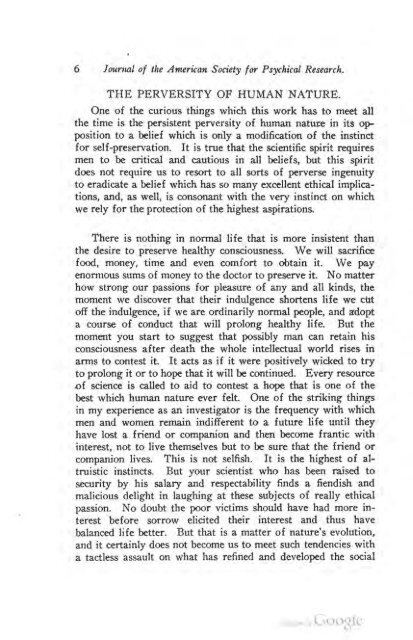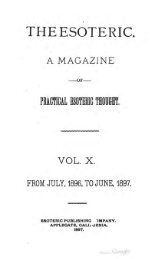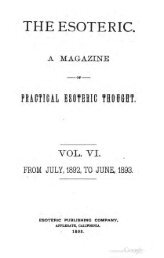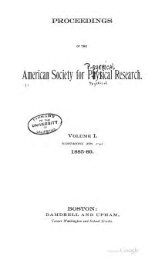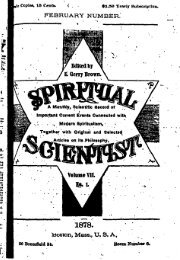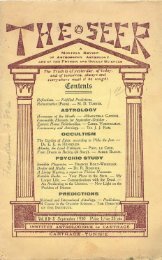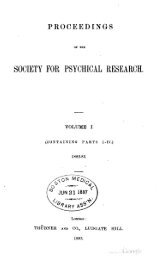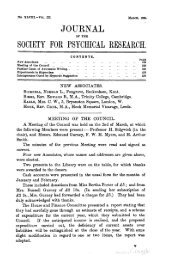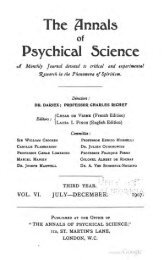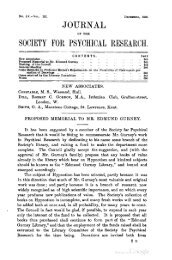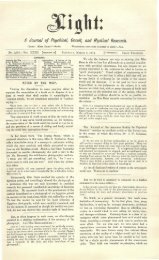- Page 1: JOURNAL OF THE American Society for
- Page 9 and 10: Illusions in Psychical Research. 3
- Page 11: Illusions in Psychical Research. 5
- Page 15 and 16: Three Evidential Chenoweth Sittings
- Page 17 and 18: Three Evidential Chenoweth Sittings
- Page 22: 16 Jour11al of the American Society
- Page 26 and 27: 20 Journal of the American Society
- Page 28 and 29: 22 Journal of the American Society
- Page 30 and 31: 24 Journal of the American Society
- Page 32: 26 JourtUZl of the American Society
- Page 39 and 40: Three Evidential Chenoweth Sittings
- Page 43 and 44: Three Evidential Chetwweth Sittings
- Page 45: Three Evidential Chenoweth Sittings
- Page 48 and 49: 42 Jour11al of the American Society
- Page 51: Predictions Fulfilled. 45 utterance
- Page 54 and 55: 48 Journal of the American Society
- Page 56: 50 Journal of the American Societ)
- Page 60: 54 Journal of the American Society
- Page 65 and 66:
Book Reviews. 59 problem of the sup
- Page 67 and 68:
Book Reviews. 61 municators that th
- Page 69:
Books Received. 63 BOOKS RECEIVED.
- Page 81:
Survey and C ommcnt. Pledged in add
- Page 85 and 86:
Incipient M ediumship. 75 the meres
- Page 87 and 88:
Incipient Mediumship. 77 give me so
- Page 92 and 93:
82 Journal of the American Society
- Page 94:
84 Journal of the American Society
- Page 100:
90 Journal of the American Society
- Page 103 and 104:
Incipient M ediumship. 93 ment excl
- Page 105 and 106:
Incipient Mcdiumship. 95 Cemetery w
- Page 107:
Incipient Mediumship. 97 the mind o
- Page 111:
Experiments in Psychometry. 1'01 Ch
- Page 115 and 116:
Experiments in Psychometry. lOS the
- Page 117 and 118:
Incidents. 107 • witness, as it s
- Page 119:
Incidents. 109 hired his team, went
- Page 123 and 124:
Incidents. 113 H. Taft, Sunday, Mar
- Page 125 and 126:
Incidents. 115 "As near as we can r
- Page 132 and 133:
118 Joumal of the American Society
- Page 134 and 135:
120 Joumal of the American Society
- Page 136 and 137:
122 Journal of the American Society
- Page 138 and 139:
124 Journal of tlte American Societ
- Page 142 and 143:
128 Journal of the American Society
- Page 144 and 145:
130 Journal of the American Society
- Page 147 and 148:
Consulting Spirits. 133 the past le
- Page 150 and 151:
136 Journal of the American Society
- Page 152 and 153:
138 Journal of the American Society
- Page 156 and 157:
142 lottrnal of the American Societ
- Page 158 and 159:
144 Journal of the American Society
- Page 160 and 161:
146 Journal of the American Society
- Page 163:
Observations of a Jurist. 149 Heali
- Page 168:
154 Journal of the American Society
- Page 171 and 172:
Incidents. 157 time being allowed f
- Page 174 and 175:
160 Journal of the American Society
- Page 177 and 178:
JOURNAL OF THE AMERICAN SOCIETYfor
- Page 180 and 181:
162 Journal of the American Society
- Page 182:
164 Joumal of the American Society
- Page 185 and 186:
Recent Experiments Contimud. 167 te
- Page 188 and 189:
170 -Journal of the American Societ
- Page 191 and 192:
Recmt Experiments c-ontinued. 173 m
- Page 195 and 196:
Recent Experiments Continued. 177 a
- Page 198:
180 Journal of the American Society
- Page 203 and 204:
Recent Experiments Continued. 185 s
- Page 205:
Recent Experiments Continued. 187 a
- Page 208 and 209:
190 Journal of the American Society
- Page 210:
192 Journal of the American Society
- Page 216 and 217:
198 Jour11al of tlae American Socid
- Page 219:
A u Psychometric" Experiment. 201 f
- Page 223 and 224:
• A " P sychonr-etric " Experinum
- Page 225 and 226:
A "Psychometric" Experiment. 207 La
- Page 228 and 229:
210 ltmrnal of tlte American Societ
- Page 232 and 233:
214 Journal of the American Society
- Page 238:
220 Jourual of tile Americmr Societ
- Page 243:
VOLUME XIV No. 5 MAY, 1920 JOURNAL
- Page 250 and 251:
228 l01lrnal of the American Societ
- Page 253:
Kant and Spiritualism. 231 physics"
- Page 257:
Reub. Field, Mathematical Prodigy.
- Page 260:
238 Journal of the American Society
- Page 264:
242 Journal of the American Society
- Page 275 and 276:
An Experiment for Raps. 253 simple
- Page 279 and 280:
Itseidents. 257 INCIDENTS. The Soci
- Page 284 and 285:
262 Journal of the American Society
- Page 286 and 287:
Fig. YII Fig. \"1 Digitized by Goog
- Page 288:
I 264 Journal of the American Socie
- Page 297 and 298:
Survey and Comment. 269 From the ti
- Page 299 and 300:
Survey and Comment. 271 It was quit
- Page 302:
274 Journal of the American Society
- Page 307 and 308:
Experiences of Miss Halderman. 279
- Page 309 and 310:
,Experiences of Miss Halderman. 281
- Page 311 and 312:
Experiences of Miss Halderman. 283
- Page 313 and 314:
Experiments for Phasmatographs. 285
- Page 315 and 316:
1st Experiment, Aug. 14th, 1918. No
- Page 317:
I Experiments for Phasmatographs. 2
- Page 320 and 321:
3rd Experiment, 1st Exposure, Aug.
- Page 322:
290 ]()Urnal of the American Societ
- Page 326:
3rd Experiment, 3rd Exposure, Aug.
- Page 330 and 331:
L. 4th Experiment, Aug. 21. Test co
- Page 332:
296 Journal of the American Society
- Page 339 and 340:
Photograph with five sitters referr
- Page 342:
304 Journal of the American Society
- Page 345:
Slander of the Dead. 307 SLANDER OF
- Page 349:
Correspondence. 311 (C.) The receiv
- Page 358:
THE AMERICAN SOCIETY FOR PSYCHICAL
- Page 361:
Death of Mrs. Elizabeth Blake. Surv
- Page 364:
322 lot1rnal of the American Societ
- Page 368 and 369:
( 326 Journal of the American Socie
- Page 372:
330 Journal of the American Society
- Page 375 and 376:
War Predictions throu(lh Mrs. Cheno
- Page 377 and 378:
War Predictions through Mrs. Chencw
- Page 379 and 380:
War Predictions through Mrs. Chnwwe
- Page 383:
Wtw Predictions through Mrs. Chenow
- Page 387 and 388:
War Predicticns through Mrs. Chenow
- Page 390:
348 Journal of the American Society
- Page 395 and 396:
A Case of Automatic Writing in the
- Page 399:
A Case of Automatic Writing in the
- Page 403:
A Case of Automatic Writing in the
- Page 408:
366 Journal of the American Society
- Page 413:
Pecteliar E%periences Connected wit
- Page 419 and 420:
Book Reviews. Well, here I am again
- Page 422:
380 Journal of the American Society
- Page 426:
THE AMERICAN SOCIETY FOR PSYCHICAL
- Page 430:
384 Journal of the American Society
- Page 434 and 435:
388 lourtUJl of the American Societ
- Page 437 and 438:
A Notable Psychometric Test. 391 SI
- Page 439:
A Notable Psychometric Test. 393 tu
- Page 445 and 446:
A Notable Psychometric Test. 399 co
- Page 447 and 448:
A Notable Psychometric Test. 401 Th
- Page 452 and 453:
406 Journal of the American Society
- Page 454:
408 Journal of the American Society
- Page 458:
412 lmtrtzal of the Amerira11 Soric
- Page 463:
A Notable Psychometric Test. 417 TH
- Page 470 and 471:
424 Journal of the A meriGa1J Socie
- Page 476:
. . . .... ·. ·· . .. ... ·· .
- Page 481 and 482:
Biographical Sketch and Impressions
- Page 486 and 487:
434 l ournal of the American Societ
- Page 488:
4.36 Journal of the American Societ
- Page 492 and 493:
4;40 Journal of the American Societ
- Page 494 and 495:
. 4:42 Journal of the American Soci
- Page 499:
James Hervey Hyslop. 447 lead, he e
- Page 509:
A Secular Saint. 457 thinking of St
- Page 513 and 514:
A Secular Saint. 461 cated this whe
- Page 518 and 519:
4:66 Journal of the American Societ
- Page 521:
Reminiscences. 469 great uncharted
- Page 534:
· .... ... .. ····· DR. HY8LO
- Page 538 and 539:
4:80 Journal of the American Societ
- Page 543:
The Scientist. 485 him angry withou
- Page 550:
492 Journal of the American Society
- Page 554 and 555:
496 Jourual of the American Society
- Page 556 and 557:
4.98 Journal of the American Societ
- Page 558:
500 Jourual of the Amcrica11 Societ
- Page 561:
The Intrepid Pioneer. 503 editions,
- Page 565 and 566:
A Letter from Professor Max Dessoi.
- Page 567:
James H. Hyslop. 509 something of t
- Page 572:
514 Journal of the American Society
- Page 576 and 577:
518 Journal of the American Society
- Page 579:
Brief Tributes Excerpted from Lette
- Page 582 and 583:
524 ]()Urual of the American Societ
- Page 586 and 587:
528 Journal of the American Society
- Page 589:
JOURNAL OF THE AMERICAN SOCIETY for
- Page 593 and 594:
Survey and Comment. 531 her daughte
- Page 595 and 596:
Survey and Comment. " Exchange them
- Page 597 and 598:
Experiments in Telekinesis. 535 in
- Page 599 and 600:
Experime11ts in T elekincsis. 537 m
- Page 601 and 602:
Experiments in T e/ekinesis. 539 Ja
- Page 604:
542 Journal of the American Society
- Page 608:
546 lcmrnal of tile American Societ
- Page 612 and 613:
550 Journal of the American Society
- Page 614:
552 Jour11al of the American Societ
- Page 619 and 620:
The Oracles of Balaam. 557 Sir, how
- Page 627 and 628:
The Oracles of Balaam. 565 of a bul
- Page 630 and 631:
568 Journal of the American Society
- Page 632 and 633:
· 570 Journal of the American Soci
- Page 635 and 636:
A Reminiscence. 573 Dr. Doyle has f
- Page 638 and 639:
576 Jourual of the American Society
- Page 640 and 641:
578 Journal rof the American Societ
- Page 642:
580 Journal of the American Society
- Page 645:
Another Tribute. 583 ANOTHER TRIBUT
- Page 654:
THE AMERICAN SOCIETY FOR PSYCHICAL
- Page 658 and 659:
592 Journal of the Amwitan Society
- Page 661 and 662:
, Clairvoyant (?) Dream. 595 down r
- Page 664 and 665:
598 Journal of the American Society
- Page 666 and 667:
600 Journal of the American Society
- Page 668 and 669:
602 Jour110/ of the American Societ
- Page 670:
604 Journal of the American Society
- Page 674:
608 Jvurna( of the American Society
- Page 677 and 678:
11 Bosh,, Proves to be Sense. 611 a
- Page 682 and 683:
616 Journal of the American Society
- Page 686 and 687:
620 Journal of the American Society
- Page 692:
626 Journal of the American Society
- Page 700:
634 Journal of the American Society
- Page 704 and 705:
638 Journal of the American Society
- Page 706 and 707:
640 Journal of the American Society
- Page 708:
642 Jour11al of the American Societ
- Page 711 and 712:
Bismarck *Bismarck; 345-346. Blake;
- Page 714:
Salter "Salter"; Mrs. : 482. Sander


